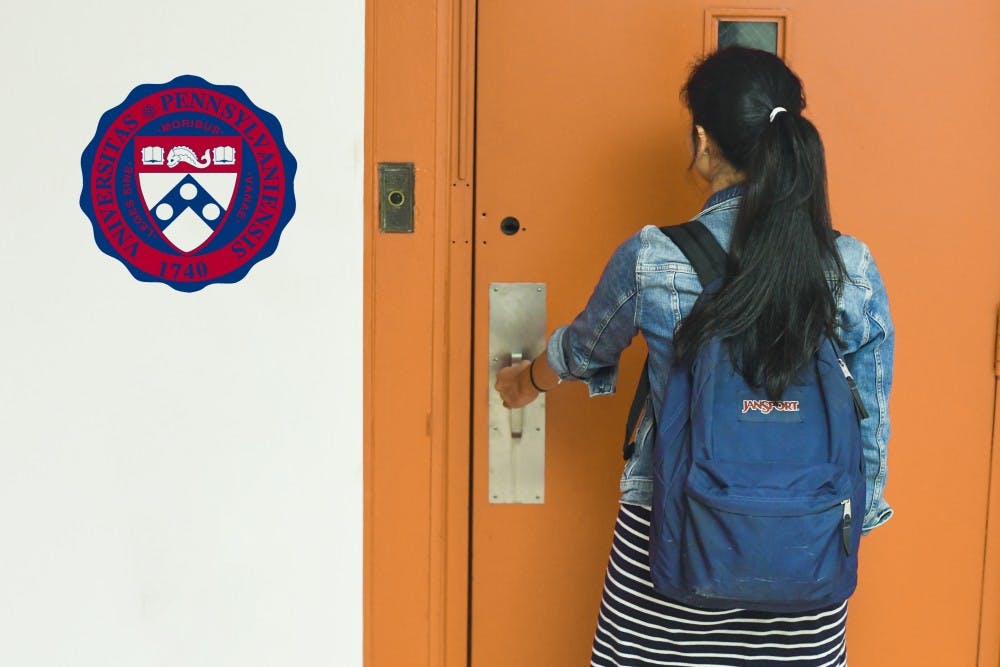Penn Medicine Summer Program for High School Students Reviews

Moving-picture show Penn'south campus mid-July – it'south a humid Philly summer, but you and most other students are far, far abroad, probably either at the embankment or at an investment bank. Still, somehow I found myself right dorsum in University Urban center, working equally an RA and TA at one of the many high school business programs on campus. Unfortunately, it became clear that many participants and their families overvalue these pre-college programs, expecting a magic shortcut to college admissions.
Summertime Locust Walk is flooded by 15-year-olds in brightly colored T-shirts and matching lanyards. Closely packed, the rainbow-branded clusters are herded around campus to experience Penn through an array of pre-higher summertime programs hosted at the University. Information technology's nigh a carnival. Step right upward and get your 30-day trial of the Penn undergrad feel before committing to the full subscription … that is, as long every bit Penn commits to y'all, as well.
So many of these programs have popped up that they overcrowd the resource on campus too used past University students. At pinnacle high school blitz hour over the summer, the line for Hill or New College Firm dining halls (the only two that were open) extended long out the door. What's more, on-campus dorms were filled to capacity, then Penn'due south programs also rented space at Drexel University to accommodate the students. Only imagine if you lot're a Penn undergrad staying on campus for the summer to squeeze in a class or two but to take your living spaces overtaken by teenage hordes.
Where do they all come up from? Some summer programs are run directly by any of Penn's 12 schools, while others are managed by partner companies. Through the Penn Pre-College Program at the School of Arts and Sciences, tenth and 11th graders tin can live on campus and enroll in a for-credit form for the price of $eleven,279 or more than. Those with tighter budgets can select a not-for-credit option similar the Summer Academies for simply $8,449. Wharton alone offers seven pre-college programs ranging from sports business to finance, and the Penn Police force Pre-College Academy and the Penn Engineering Summer Academy are other popular options.
With the astronomical price tag, it's worth wondering what students and their parents expect to gain from these programs – and whether they actually get information technology. The first question on many eager participants' minds is whether they will become an edge in the admissions procedure for doing a program at their dream school. Well, the reply is no. In fact, pre-college summer programs generally signify wealth and opportunity to admissions officers, rather than achievement. When students are asked to describe their summertime experience on the Mutual Application – did they work every bit a cashier at Walmart? Volunteer at a hospital? Lounge by the pool? – admissions officers are looking for signs of personal development and personality much more than than whether a fancy proper noun is attached.
Permit me speak from experience. Most of the high school students I met during the plan were incredibly smart, curious, and eager to make the most of their time. About also had some degree of anxiety over the college admissions process. I witnessed their stress and doubtfulness about the futurity, which I was both complicit in and tried to diminish. I student told me that he couldn't help only feel – all the same irrationally – that the business program and pitch that he developed equally a final projection was a test of whether or not he was qualified for Wharton. And who tin arraign him?
In reality, these pre-higher programs both feed into and are fed by the increasingly competitive college admissions civilization. And Penn is not alone; Yale, Stanford, Harvard, Dark-brown, and most other big-name schools boast similar programs encouraging students to "go a experience for what college life is like," equally Summer@Brownish puts information technology.
Let's exist clear – these programs tin still be astonishing experiences for students: a take chances to meet interesting people, face new bookish challenges, and live in a new environment. Not to mention, some offer scholarships and financial aid to expand access. Still, the base of operations of nearly pre-higher programs are upper-income families, and what most of them are paying for is just non worth it. Instead, high schoolers eager to proceeds an border in the admissions process would get a ameliorate deal past enrolling in a course at a community college or online, not to mention getting a job.
The inexhaustible need for plush pre-college programs bear witness that Penn and its peer institutions are businesses with powerful make names to be exploited. In fact, the higher tuition climbs, the more creativity and trial rounds volition be required to sell information technology every bit both an investment and an feel. In that respect, pre-college programs are in danger of resembling an advertising campaign or trial catamenia for consumers, rather than a growth opportunity for adolescents.

JULIA MITCHELL is a College and Wharton freshman from Yardley, Pa. studying International Relations. Her electronic mail address is jcmitch@wharton.upenn.edu.
More Like This
jackmanunshes1939.blogspot.com
Source: http://www.thedp.com/article/2019/09/pre-college-ivy-league-harvard-stanford-brown-wharton-upenn-philadelphia
Postar um comentário for "Penn Medicine Summer Program for High School Students Reviews"